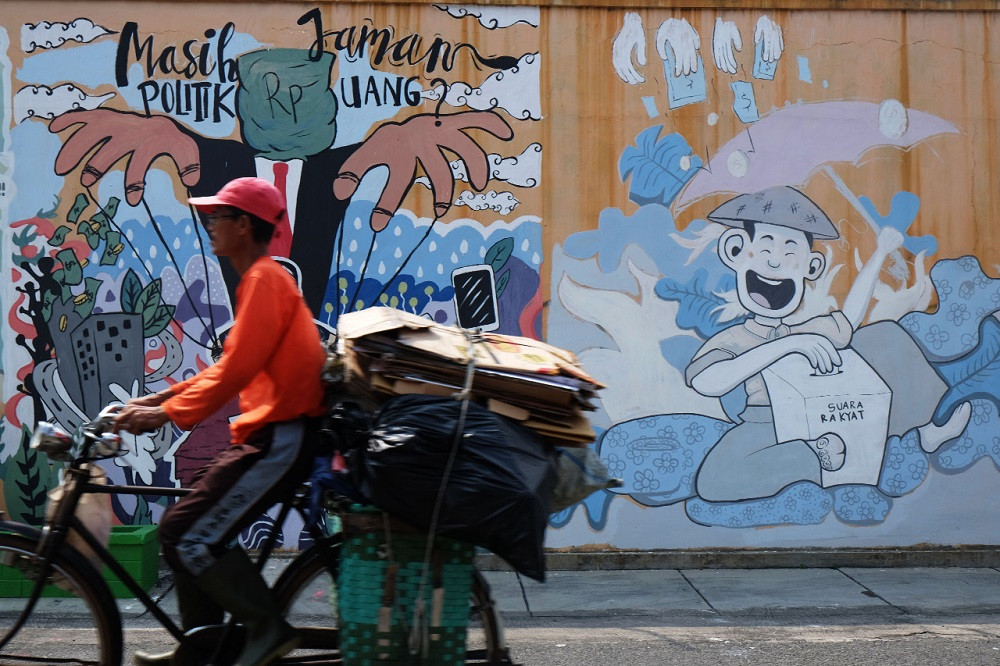Popular Reads
Top Results
Can't find what you're looking for?
View all search resultsPopular Reads
Top Results
Can't find what you're looking for?
View all search resultsRisk of fintech misuse for money politics in elections
In 2018, the Elections Supervisory Body (Bawaslu) discovered indications that e-money was being used in money politics.
Change text size
Gift Premium Articles
to Anyone
I
n the fast-growing financial services sector, a combination of technological improvements and changing customer behavior has driven the evolution of fintech, with many fintech companies offering alternative financial services such as payment gateways, loans and investments. Indonesia has responded positively to the growth of fintech, as is evident in the increasing numbers of industry players and consumers over the last few years.
According to the Financial Services Authority (OJK) and Bank Indonesia (BI), Indonesia has 190 licensed fintech providers to date, primarily payment and lending fintech. In 2019, electronic money (e-money) transactions hit Rp 100 trillion (US$6.89 billion) while in the lending sector, electronic transactions continue to increase every year. This September, total loans disbursed through fintech lenders reached Rp 128 trillion and involved 29 million borrower accounts.
Next week, we will see the simultaneous regional elections. The people of nine provinces, 37 cities and 224 regencies will vote for their preferred candidate to lead their region for the next five years. The elections are more crucial and challenging than ever due to the COVID-19 pandemic.
The General Elections Commission (KPU) has imposed various restrictions on the election campaigns to prevent further spread of the virus. Candidates are prohibited from holding campaign events that could attract large crowds. Hence, it is now rare that candidates host large public gatherings, such as art exhibitions, sports events and concerts.
These restrictions could drive “delinquent candidates” to seek a shortcut to gain votes and win the election. Aspinall et al. (2017) found that, despite the uncertainty that the election result will fully reflect any potential gains from vote buying, there are still candidates who resort to using this tactic. The common practice is to buy votes by delivering cash in an envelope, typically with the candidate’s campaign flyer attached.
However, the method has been developing. In 2018, the Elections Supervisory Body (Bawaslu) discovered indications that e-money was being used in money politics. The candidate was suspected of allocating e-money to voters. Given the current fintech developments, it is possible that this will emerge again. It may even expand to involve other fintech products.
Digital wallet providers are competing to expand outside Jakarta, although iPrice revealed that the coverage outside Jakarta varied among digital wallet providers in the second quarter of 2020. For example, 83 percent of users of a state-owned digital wallet were located outside Jakarta, with 40 percent outside Java. This coverage therefore increases the potential abuse of fintech in the upcoming elections.
Payment fintech is the easiest means for such abuse. Besides e-money, a candidate may also use a digital wallet. Many people nowadays use digital wallets for transfers, transportation, food deliveries and bills. Several digital wallets are also connected to e-commerce platforms.
Given the increase in e-commerce transactions as a result of the pandemic, offering free digital wallet top-ups and balance transfers could attract voters. Although there are limits to the maximum top-ups and balances for digital wallets, this method could have a wide impact if it is done systematically and on a large scale.
Another potential form of fintech abuse in the regional elections is the use of illegal peer-to-peer (P2P) lenders. P2P lending platforms bridge lenders and borrowers without the need to go through conventional financial institutions. P2P lenders should be mere intermediaries and must not interfere in the process between lenders and borrowers.
However, this does not apply to illegal (unlicensed) P2P lenders. If a candidate cooperates with an illegal P2P lender, it is possible to collect, move and distribute funds illicitly. The recent closure of 206 P2P lending platforms on Oct. 27 by the OJK’s Investment Alert Task Force proves that the pandemic is no obstacle to the operations of illegal P2P lenders.
Mitigating this calls for integrated cooperation between government agencies, including Bawaslu and the Financial Transaction Reports and Analysis Center (PPATK). Bawaslu plays a highly strategic role in supervising the regional elections. Despite the challenges of its limited authority, it should follow up on any alleged violations of the ban on money politics with integrity and professionalism.
The presence of the PPATK as the financial intelligence unit is also necessary for supervisory support, considering that money politics, whether conventional or fintech, must involve money. “Follow the money” is the key to identifying the source of the funds.
Apart from monitoring regulators, the public also has a responsibility in overseeing this and must have the courage to report any suspicions of money politics. In the end, they are the ones to feel the impact of the election results.
To sum up, fintech will surely develop as long as technology continues to advance and evolve, and as long as the market demand is there. In fact, although the rise of potential risks cannot be stopped, steps must be taken to mitigate them.
Monitoring the potential for money politics, through either conventional means or the use of advanced technology, is an absolute obligation for both government and society alike, so as to maintain the integrity and credibility of Indonesia’s democracy.
***
The writer is a financial crime analyst.










